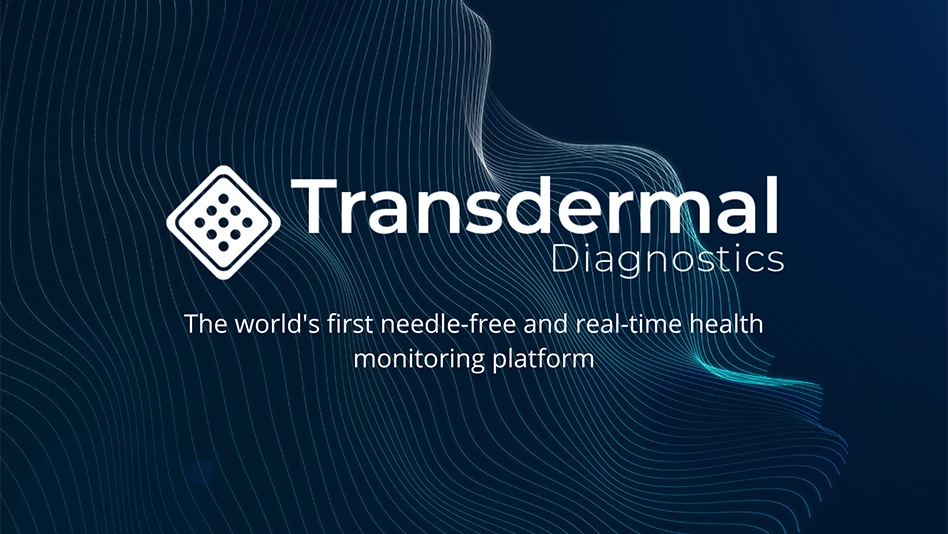
Transdermal Diagnostics
Transdermal Diagnostics, a University of Bath spinout company developing technology to monitor glucose levels non-invasively, has received £800,000 in seed funding and a £300,000 grant from Innovate UK.
The researchers have invented a wearable patch that allows people with diabetes to painlessly monitor their blood glucose levels. The £1.1M will advance the team's cutting-edge technology towards commercialization.
The technology promises to enable people living with diabetes to significantly slow down, or even prevent, the progression of the disease by monitoring blood glucose levels around the clock in a completely painless manner. The patch will sample glucose through the skin and will eliminate the need for the poorly tolerated finger-prick blood test. Readings will be transmitted wirelessly to a mobile phone.
In March this year, the researchers – led by by Dr Adelina Ilie, Dr Luca Lipani, and Professor Richard Guy from the Departments of Physics and Life Sciences at the University of Bath – established the spinout company that will continue to develop the patch.
Funding
Following the award of an Innovate UK grant of £300K at its inception, Transdermal Diagnostics has closed a pre-seed investment round of nearly £800,000.
The funding round was led by QUBIS, which specializes in innovation focused spin-out companies, and includes Pioneer Group, Immetric, Bristol Private Equity Club, and Science Angel Syndicate.
Dr Ilie, chief scientific officer and director at Transdermal Diagnostics, says: “Our wearable, affordable patch will appeal particularly to people living with Type-2 diabetes and those considered to be pre-diabetic. It has great market potential because no such technology currently exists on the market.”
She adds: “Developing the patch needed a truly interdisciplinary approach, and it was only made possible by the latest advances across multiple fields, such as advanced nanomaterials, nano- and bio-technology, and machine learning-driven data analysis. Scalable methods able to deliver a device like ours on a flexible platform were also essential.”
Dr Lipani, CEO and director of the company, says: “Our technology equips users with the knowledge to manage and make informed decisions about their health, and we’re delighted to have achieved the milestones of spinning-out the company and acquiring the investment needed to move the technology forward.
“We have a great team and I’m confident we will be able to make a tremendous impact on chronic disease management, particularly for those individuals living with diabetes desperate to get rid of those painful finger-pricks for blood sugar monitoring.
Company director Professor Richard Guy says: “The spin-out of Transdermal Diagnostics provides the impetus to develop a revolutionary, affordable and needle-free glucose monitoring technology to inhibit or even arrest the progression of diabetes, enabling those living with the disease to safely and effectively manage and control their blood sugar levels.”
Patented technology
The patented patch technology – first reported in Nature Nanotechnology in 2018 – uses a unique multiplex architecture to sample, via preferential pathways, the fluid that nurtures the living cells of the skin. This fluid contains glucose at a level that is very similar to that found in the blood. The approach enables the amount of glucose sampled to be detected and quantified non-invasively, without puncturing the skin, thereby avoiding any need for a blood sample.
The process of spinning out the new company was catalyzed by the research team’s involvement in the Innovate UK Innovation to Commercialisation of University Research (ICURe) Discovery program delivered by North by North West partners.
ICURe allowed the company’s founders to determine market validity and the commercial potential of their glucose-monitoring technology. As a result, Transdermal Diagnostics was awarded an Innovate UK grant of £300K. The company has also received valuable input via the SETsquared Scale-Up Programme.
Transdermal’s path through the ICURe program was supported by business advisor and now company non-executive director, Dr Ben Miles, who is the CEO and founder of Spin Up Science.
Drs Jenni Rogers and Phil Brown of the University’s Research & Innovation Services, which supported the creation of Transdermal Diagnostics. Dr Rogers says: “We’re delighted to see Transdermal Diagnostics spin out from the university. The technology has great potential to benefit people with diabetes, in particular, and we look forward to seeing its commercial realization.”
Latest from Today's Medical Developments
- UCIMU: fourth quarter 2024 machine tool orders on the rise
- Thomson Industries’ enhanced configuration capabilities
- Frequently Asked Questions about AM Post Processing
- Midwest DISCOVER MORE WITH MAZAK
- Reshoring survey to provide insight for US industrial policy
- NB Corporation of America's ball splines
- AdvaMed seeks medical technology exemption from all tariffs
- Zimmer Biomet to acquire Paragon 28





